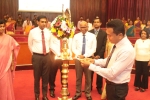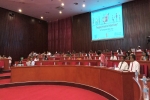The primary goal of the health services in Sri Lanka since its inception has been the provision of health care of good quality, free at the point of delivery and ensuring equitable coverage. However, the health system faces new challenges from the demographic, epidemiological and social transitions that the country is experiencing. Key issues that the health system is currently faced with are: underutilization of primary level curative care institutions, a culture of self-referral and lack of an effective referral mechanism which has resulted in bypassing the closest primary care institutions. Same time care provision is episodic and lacking in continuity.
The Government of Sri Lanka has shown continuing commitment towards improving Primary Health Care (PHC) through the primary care restructuring programme. The goal of these initiatives is to ensure universal health coverage to all citizens, relevant to the disease burden experienced in the country through a well-integrated, comprehensive and efficient health service.
DHQS as the apex body of healthcare quality and safety provided the task of preparing a supervisory tool and indicators that could evaluate the quality of care provided by the primary care institution at the provincial and RDHS levels.
DHQS developed the supervision tool with the participation of the relevant stakeholders based on the following:
- Cleanliness and other aspects of physical infrastructure based on checklists.
- Storage and availability of drugs.
- Waiting times for attention, time is taken for the whole process from entry to exit.
- Observation of client-provider interactions based on a checklist.
- Using records to examine compliance with appropriate guidelines.
- Client perceptions of the quality of care received.
RDHS needs to carry out supervisory visits and reports need to be sent to the DHQS quarterly basis for further analysis.
Primary Health Care Supervision Part A Checklist for Supervision of Primary Level Institutions General & Outpatient Department
| Item |
|
| General |
- Garden is free of litter
- Absence of unwanted trees & branches
- Garden is properly maintained and landscaped
- Unpleasant odour is not produced from the hospital waste site or from other places
- Drains are not leaking or overflowing
- Stagnation of water is avoided in all drains
- Absence of Stray dogs/cats/cattle in hospital premises
|
| Information to Public / Way Finding / Communication |
- Hospital Name Board is displayed outside in all three languages
- Site map on display at the entrance/reception area in all three languages
- Information desk with trained person is available all the time in functional hours
- Availability of display boards in patient waiting areas to give important health information (Clinic dates, work hours, doctor on call, health ministry notifications)
- Direction boards displayed at every junction within the hospital premises
- Availability of a functional telephone line
- Parking areas for vehicles are specified and marked
|
| Water Supply & Electricity |
- Water is pipe borne
- Water is drawn from a well
- Storage Facility / Well
- Storage tank available
- Whether sample has been tested for water quality
- Are patients provided with clean drinking water
- Are staff provided with clean drinking water
- Absence of leaking taps in the premises
- Generator available and in working order
- Unnecessary lights and fans are switched off, which leads to wastage of electricity
|
| General OPD |
- A sufficient number of seating facilities (minimum of 1/4 of the daily attendance) is available in the waiting area
- Seating facilities are arranged in order
- The layout of the waiting area is well organized
- Waiting area is adequately ventilated
- Availability of an appointment system for consultations
- Dressing Room
- Hand Washing sinks are available with clean towels and soaps
- Surgical gloves are available, arranged according to their sizes
- Sterilized instruments, packets and dressings are kept in a cupboard with a written indication of sterility
- Procedures performed under aseptic conditions
- Injection Room
- Hand Washing sink is available with clean towels and soaps
- Surgical gloves are available, arranged according to their sizes
- Sterilized instruments, packets and dressings are kept in a cupboard with a written indication of sterility
- Procedures performed under aseptic conditions
- OPD Toilets
- Adequate number of toilets available (Functional)
- Toilets are differently-abled persons available
- Unpleasant odour is not felt in toilets
- Cleaning checklist available and updated
- Toilets are adequately ventilated
- Water supply available
|
| Dental Unit |
- Availability of the functioning dental unit (Dental chair, Scaler, Light Curing Machine)
- Unpleasant odour is not felt in dental unit
- Cleaning checklist available and updated
- Adequate lighting and ventilation is available
- Availability of running water
- Average no of patients seen per day by each dental surgeon
|
| ETU |
- Availability of a functioning emergency treatment unit
- Availability of a separate ETU register
- Availability of essential equipment in accessible place
- Nebulizer
- Oxygen Cylinders filled
- Sucker machine
- ET tubes and tracheotomy tubes
- Glucometer with strips
- ECG and defibrillator
- Ambu bag with mask
- Any equipment not in working order
|
| ECG Room |
- Availability
- Number of ECGs taken per day
|
| Sputum collection center |
|
| Activities at HLC |
- Attendance M:F ratio for previous month
- Number of afternoon lifestyle guidance sessions conducted at HLC in last month
- Total no of attendees for the afternoon lifestyle guidance clinics during last month
|
| Human Resources |
- Duty rosters are displayed in the office
- % Attendance on the day of supervision out of number in position
- Doctors
- Nurses
- Midwives
- MLT
- Pharmacist
- Minor other staff
- Punctuality : percentage of staff signing after the red line
- Any priority vacancies
|
| Personal Health records |
- Maintenance of register for issuing PHR
- Date of last issue of PHR according to the register
|
| Ambulance |
- Availability
- If yes, is it in working order
- Allocated place for planning
|
| Hospital Development Committee |
- Availability of a hospital development committee
- Date of last meeting of hospital development committee
- Availability of meeting minutes
|
| Logbook |
- Availability of visitors book
|
| Donation Register |
- Availability of a donation register
|
| Suggestions Box |
- Availability of a suggestions box
- Percentage of suggestions acted upon accordingly for the last month
|
| Availability if Administrative committees |
- Drug review committee
- Number of meetings for last quarter
- Availability of meeting minutes
- Hospital management committees
|
-
Details
-
4396views








